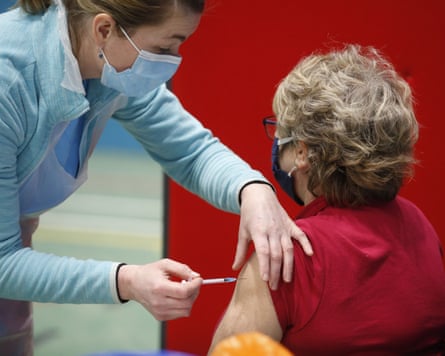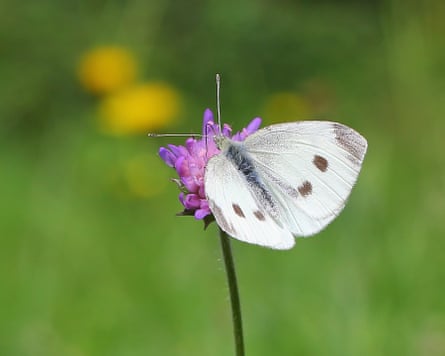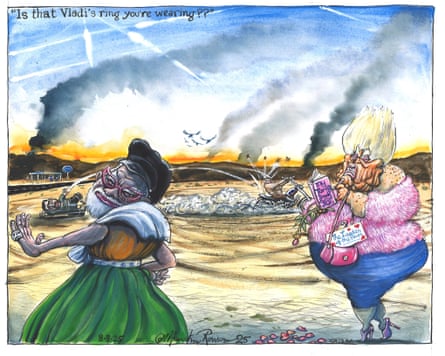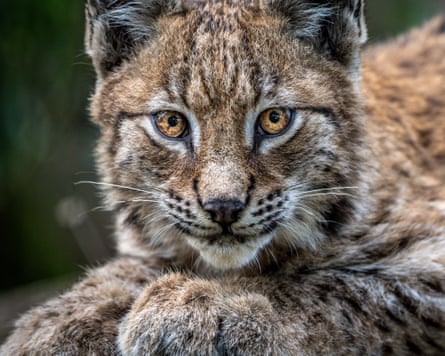Good morning. You may have heard a saying along the lines that “when the US sneezes, the rest of the world catches a cold”. So when the US health department announced plans to cut half a billion dollars in vaccine research funding on Wednesday, the world took notice.
The US is the world’s largest funder of biomedical research, but this position has become more precarious with the appointment of Robert F Kennedy Jr, a longtime vaccine sceptic, as US health secretary.
This week, Kennedy has announced plans to terminate 22 federal contracts for mRNA-based vaccines, casting doubt on the safety of a technology widely credited with helping end the Covid-19 pandemic and saving millions of lives.
In total the affected projects are worth nearly $500m (£376m), according to the health agency. As for Kennedy, he said: “We reviewed the science, listened to the experts, and acted.”
The only problem? The scientific community in the US and around the world has overwhelmingly condemned the decision. To understand why, for today’s newsletter I spoke to Michael Head, a global health researcher at the University of Southampton. That’s after the headlines.
Five big stories
-
Israel-Gaza war | Benjamin Netanyahu’s office said his security cabinet had approved a plan to take over Gaza City after the prime minister earlier said Israel planned to take full control of the Palestinian territory. The decision early on Friday marks another escalation of Israel’s offensive in Gaza. Follow developments live
-
Ukraine | Volodymyr Zelenskyy said ahead of an expected meeting between Donald Trump and Vladimir Putin that Europe must participate in the peace process between Ukraine and Russia. As the Kremlin refused a three-way meeting with Zelenskyy and Trump, the Ukrainian president said: “Ukraine is not afraid of meetings and expects the same brave approach from the Russian side.”
-
Economy | The chancellor and prime minister will begin to foreshadow tax rises and reforms from September to prepare the country for a difficult budget that could be held in November, the Guardian has been told. A rise in gambling levies – advocated by Gordon Brown – is thought to be near-guaranteed as part of the package of tax rises.
-
UK news | Amnesty International has warned the Met police against arresting participants protesting this Saturday in London in support of Palestine Action.
-
Labour | The UK homelessness minister, Rushanara Ali, resigned after it emerged she evicted tenants from her east London property before increasing the rent by almost £700 a month.
In depth: ‘The mRNA vaccines saved about 20 million lives’

The first thing to understand is that mRNA vaccines work differently from traditional ones. The latter generally introduce a weakened or inactivated part of a virus to train the immune system to recognise and fight it in the future; whereas mRNA vaccines use a molecule that tells our cells how to make a viral protein, which triggers the body’s immune responses.
This technology is a scientific gamechanger, to the extent the researchers behind it won the Nobel prize in 2023. But since rising to prominence during the Covid pandemic, mRNA vaccines have been dogged by misinformation (this analysis by my colleague Nicola Davis is well worth a read.)
Michael Head tells me that mRNA technology offers a very effective and adaptable approach to developing vaccines. “It’s often described as plug-and-play because you can adapt constituents of the vaccine with, for example, the latest Covid variant.”
For something like a flu vaccine, researchers need to incubate the virus and grow it, which takes weeks, Head explains. “That’s fine to an extent when it comes to producing an annual vaccine like we do for seasonal influenza, but the advantage to mRNA technology is that it can be updated so quickly that it allows us to produce new vaccines or update existing vaccines quicker, which can hopefully then reduce the threat of whatever infectious disease is present.”
This is crucial during a pandemic such as Covid. “The mRNA vaccines saved about 20 million lives globally in the first year of their rollout,” Head says.
Why is Kennedy doing this?
Kennedy once described mRNA Covid vaccines as “the deadliest vaccine ever made”. On Wednesday, he justified the health agency’s decision to terminate research by claiming that data shows mRNA vaccines “fail to protect effectively against upper respiratory infections like Covid and flu”.
Kennedy offered no scientific evidence to support this – and Head said Kennedy has been spreading vaccine misinformation for years. “He has on at least one or two occasions compared vaccines to being like the Holocaust, a common anti-vaccine trope.”
He has also recently falsely claimed vaccines such as the measles, mumps and rubella (MMR) jab contain “aborted foetus debris”; ordered a sweeping new study on the long-debunked link between vaccines and autism; and dismissed a panel of government vaccine experts, replacing them with his own appointees – who then voted to ban a longstanding vaccine preservative that has been a frequent target of the anti-vaccine movement despite its strong safety record.
Kennedy claims he is shutting down research on mRNA vaccines and instead shifting funding to “safer, broader vaccine platforms that remain effective even as viruses mutate”, and that mRNA vaccines “encourage new mutations and can actually prolong pandemics”.
It’s just not true, though. Head says variants actually tend to emerge in the absence of vaccinations, and in people with long-term infections – often those who are immunocompromised and can’t get over the virus quickly. That gives the virus more chances to multiply and mutate.
“Vaccines reduce the risk of transmission and infection,” Head says, which means fewer opportunities for the virus to mutate. “So vaccines will have a protective effect against new variants emerging, rather than as Kennedy suggests.”
What impact will this have?
The question of the next pandemic is not if, but when. History shows pandemics happen, Head says, pointing to the 1918 flu pandemic, swine flu, Sars, and of course Covid.
Head says this is especially true in our era of globalisation and human encroachment into new environments. “If you create enough opportunities, a new virus will enter human beings. There might be a scenario where it runs out of control like we saw with Covid. Or, it might be a bit more like Sars, where we were able to get it under control within a couple of months.
“But again, globalisation and the mixing of people and animals makes things more challenging. And so a pandemic will happen at some point. We just don’t know when.”
Technologies like mRNA vaccines, then, are vital. Head added that the potential applications go far beyond infectious disease.
“There’s quite promising research on skin cancer and the potential for this technology to be applied across different areas of health,” Head says. That is another reason Kennedy’s decision is so damaging, he adds.
One of Head’s research areas focuses on how funding decisions impact science such as cancer research. “It’s very early days, but we are starting to see a slightly alarming picture. It’ll be very hard for the rest of the world to fill the cancer research gaps that the US is likely to leave.”
Is this a worrying time for the scientific community?
There is no way to sugarcoat it; this is a particularly alarming moment for scientists. The World Health Organization coined the term “infodemic” during the pandemic to describe the overwhelming amount of misinformation that spreads during a public health crisis, Head says. Even before Covid, in 2019 the WHO listed vaccine hesitancy as one of the top 10 global health threats.
“I have huge concerns that if a pandemic happened again tomorrow, whether populations in the UK, US, and around the world would trust public health decision making that would be vital to mitigate the impacts of any new pandemic. So the role of misinformation is significant and it can be very severe,” Head warned.
“It does not help that some of the most powerful people, like US president Donald Trump and Robert F Kennedy Jr, are making poor quality comments on vaccination because that does have an impact on population level decision making.”
Some of Head’s research has looked into vaccine uptake in Ghana during the pandemic. The study found that political views played a big role in whether someone agreed to receive a Covid vaccine.
“The government was saying, go and get vaccinated, please, but there was a fair amount of anti-government sentiment at the time. And hesitancy was greater if you voted for the opposition and therefore trusted the government messaging less. So there are lessons to be learned on who delivers the messaging to get your vaccine, and how to address that lack of trust in governance,” Head said.
For now, the world holds its breath … and hopes no one sneezes.
after newsletter promotion
What else we’ve been reading

-
Patrick Barkham’s piece about the recent hopeful surge of some wildlife is both a joyous celebration of animals’ resilience and a call for us to give them a helping hand. Lucinda Everett, newsletters
-
I love this ranking of Daniel Day-Lewis films, and to learn that the triple Oscar winner has retired from acting, and returned twice. Aamna
-
We asked our readers to share the strangest things they’ve found in a new home, and they didn’t disappoint. Forgotten placenta, anyone? Lucinda
-
This story by my colleague Mark Townsend is extraordinary: it pieces together, using intelligence reports and witness testimony, how the RSF paramilitary began a massacre described as “genocidal” in Zamzam refugee camp. Aamna
-
Daniel Boffey examines how David Lammy is wooing JD Vance, from inviting the US vice-president to pray with him, to shedding tears over his memoir. Lucinda
Sport

Tennis | Ahead of the Cincinnati Open, Emma Raducanu told Tumaini Carayol in an exclusive interview that she believes her new coaching partnership with Francisco Roig can help to take her game to the next level.
Football | Liverpool have agreed a fee of £46.3m plus add-ons with Al-Hilal for Darwin Núñez. The Uruguay international is expected to complete a move to the Saudi Pro League once personal terms have been finalised.
Cricket | The leader of the Tech Titans consortium that has bought 49% of London Spirit believes the Hundred will become a multibillion-dollar competition to rival the Indian Premier League.
The front pages

The Guardian print edition reports “Netanyahu defies warnings over taking military control of all Gaza”. “Minister resigns over rental ‘hypocrisy” – that’s the Telegraph while the i paper expands on that: “UK’s minister for homelessness quits after she’s caught ejecting tenants and hiking rent”. “Minister for hypocrisy is forced to quit” the Mail delights. “Single-sex spaces ‘off limits to trans women’” says the Times. “Weight loss pill ‘on NHS’” and “Pill for weight loss on NHS” – the Mirror and Express both says it’s a possibility. Deep breath needed before reading the FT’s headline aloud: “BoE lowers rates but tight vote forces investors to rein in bets on more cuts”. “He’s our brave little miracle” reports the Metro, about a lifesaving “world-first operation” on a little boy.
Something for the weekend
Our critics’ roundup of the best things to watch, read, play and listen to right now

Music
Amaarae: Black Star | ★★★★☆
Weaving elements of house, trance and EDM into Afrobeats rhythms and spiky rap cadences, the Ghanaian-American singer’s slick take on a club record is deliriously in love with wealth, celebrity and all the power it affords. But there is a difference between Amaarae and the other stars fixated on such topics: for her, glamour is a side quest and love is the motive. Shaad D’Souza
TV
Lucy Letby: Beyond Reasonable Doubt? | ★★★★★
Neonatal nurse Lucy Letby became, in tabloid parlance, “Britain’s worst child serial killer” when she was convicted in 2023 of seven murders and seven attempted murders of infants in her care. This brilliantly cogent documentary, which forces sentiment aside and unpacks the science and statistics around the most contested pieces of evidence, covers more ground more meticulously in an hour than any documentary I’ve seen in recent years, and perhaps ever. Lucy Mangan
Film
The Kingdom | ★★★★☆
Lesia, a moody 15-year-old, is sent to her mob boss father’s luxurious and fortified family compound , and she is thrilled when she quickly becomes lieutenant. There are fierce and overwhelmingly authentic performances from first-time actors in Julien Colonna’s intensely atmospheric, absorbing and exciting drama. Peter Bradshaw
Games
Time Flies | ★★★★☆
This perception-warping bug puzzler reimagines the inevitably short lifespan of a housefly as an absurd tragedy – by providing the soon-to-perish pest with a bucket list. Over the course of roughly a minute, players buzz around minimalist 2D environments trying to make those last wishes come true. By blending this thinky thesis with playful mechanics, it supplies a lighthearted canvas for players to engage with existentialism for an hour or two. Sarah Thwaites
Today in Focus

Inside China’s fast-fashion factories as a US trade war looms
The Guardian’s senior China correspondent, Amy Hawkins, visits factories threatened by US tariffs in Guangzhou, south China, as the deadline for a US-China trade agreement approaches with no deal yet in sight.
Cartoon of the day | Martin Rowson

The Upside
A bit of good news to remind you that the world’s not all bad

Lynx – shy wild cats no bigger than a Labrador – became extinct in Britain 1,300 years ago thanks to hunting and habitat loss. But a paper published in the Journal of Environmental Management says the animals could thrive in Northumberland’s Kielder Forest area. The paper found that releasing 20 lynx over several years would eventually create a healthy population of about 50 animals, bringing benefits like helping to curb the overpopulation of deer in woodlands. According to the researchers, Kielder Forest is the only area of England and Wales with enough woodland for lynx to thrive. But thankfully locals are keen on the plan, with 72% of people in the project area supporting reintroduction.
Sign up here for a weekly roundup of The Upside, sent to you every Sunday
Bored at work?
And finally, the Guardian’s puzzles are here to keep you entertained throughout the day. Until tomorrow.

 German (DE)
German (DE)  English (US)
English (US)  Spanish (ES)
Spanish (ES)  French (FR)
French (FR)  Hindi (IN)
Hindi (IN)  Italian (IT)
Italian (IT)  Russian (RU)
Russian (RU)  3 hours ago
3 hours ago























Comments